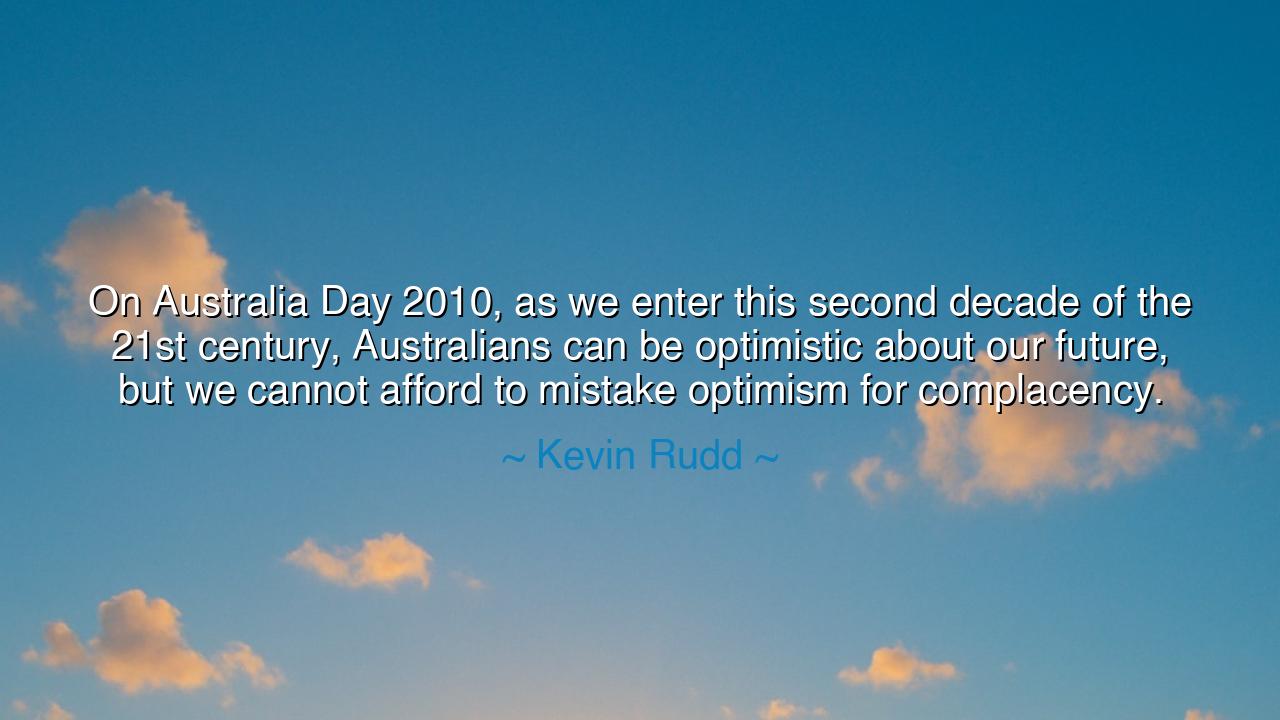
On Australia Day 2010, as we enter this second decade of the 21st
On Australia Day 2010, as we enter this second decade of the 21st century, Australians can be optimistic about our future, but we cannot afford to mistake optimism for complacency.






In the great unfolding story of nations, there are moments when a people stand on the precipice of greatness, gazing toward the horizon of possibility. These are moments that call for both reflection and action, for a balance between hope and caution. On Australia Day 2010, as the second decade of the 21st century began, the words of Kevin Rudd rang out with a powerful reminder: “Australians can be optimistic about our future, but we cannot afford to mistake optimism for complacency.” In these words lies a profound truth, one that echoes through the ages—the peril of becoming content in the face of progress, of believing that optimism alone is enough to secure a prosperous future.
The great empires of history, those that have lasted and thrived, did not reach their heights by being complacent. They rose because they recognized the need for constant effort, for action, and for the constant shaping of their destiny. To be optimistic, to look forward with hope, is natural. But to become complacent is to become blind to the challenges that lie ahead. The Greek philosopher Plato once warned that complacency is the enemy of progress, for it leads one to rest on the laurels of the past and ignore the shifting tides of the present and future. This is why Rudd’s words carry so much weight—he speaks not only to the Australians of his time but to all people who would see their nations prosper: do not mistake the warmth of hope for the security of accomplishment.
Consider the rise of the Roman Empire—a civilization whose reach and glory were once unparalleled. For centuries, it stood as the beacon of power and achievement. But over time, the leaders of Rome became complacent. They began to believe that the systems they had built were impervious to change. The result was the slow and steady decline of what was once the most powerful empire in the world. Rome's complacency allowed invaders to slip through its borders, weakened its infrastructure, and caused its citizens to lose sight of the virtues that had once made them great. In their optimism, they failed to see the dangers on the horizon, and in their complacency, they did nothing to stop them.
In more recent history, we can look to the example of Japan after World War II. The devastation was absolute; the future uncertain. Yet, rather than succumbing to despair or complacency, the Japanese people embraced a future full of possibility. Optimism fueled their recovery, but it was not an idle hope—it was the optimism that drives a nation to rebuild, to innovate, and to strive for greatness. Japan’s rapid recovery, and its rise to become one of the world’s economic powerhouses, was not the result of mere hope, but of hard work, resilience, and an unwavering commitment to action.
Kevin Rudd’s words remind us that the true strength of a nation lies not in its good fortune or its past successes, but in its ability to act boldly, to recognize challenges before they overwhelm, and to continuously adapt to the changing landscape. Optimism is the spark that ignites the fire, but it is action, awareness, and effort that sustain it. This is the lesson we must carry with us into the future: do not rest in the warmth of hope, but rather let it propel you into the diligent work needed to secure that future.
For the people of Australia, as for all peoples, the path to greatness lies not in blind optimism but in a combination of hope, action, and reflection. If we are to ensure that the promise of a prosperous future is realized, we must not be satisfied with simple dreams, but instead, work relentlessly to transform those dreams into reality. Let us build the foundations of the future with the strength of resolve and the clarity of vision.
And so, as the years roll forward, let the wisdom of Rudd’s words guide us: optimism is the beginning, but vigilance and action are the true measures of success. Let us not fall into the trap of complacency, for it is in the pursuit of excellence, in the continual striving for improvement, that a nation finds its true strength. We must look ahead, not with idle hope, but with determined hearts and steadfast hands—for it is only through hard work, reflection, and persistent action that we will achieve the future we dream of.






AAdministratorAdministrator
Welcome, honored guests. Please leave a comment, we will respond soon